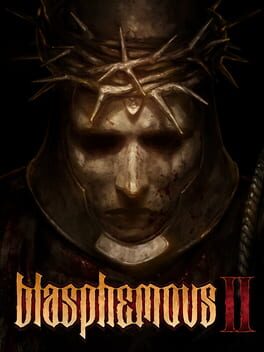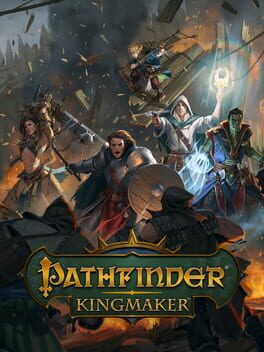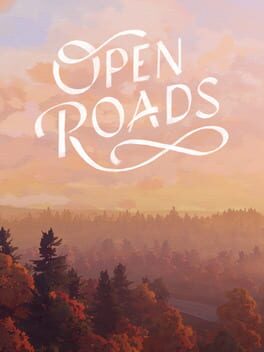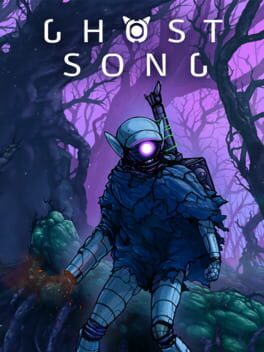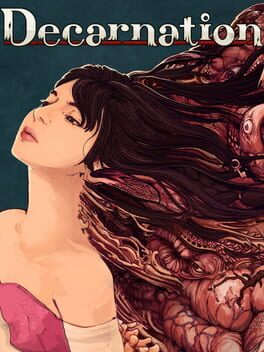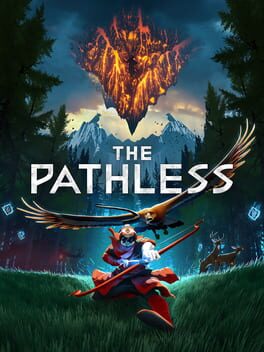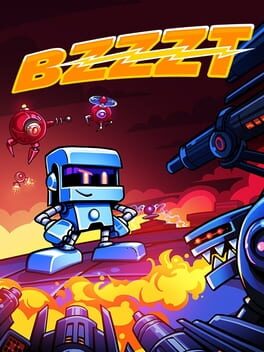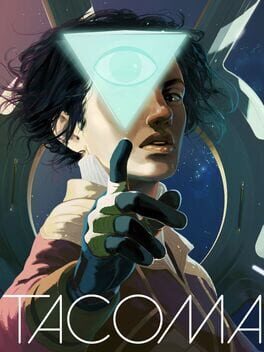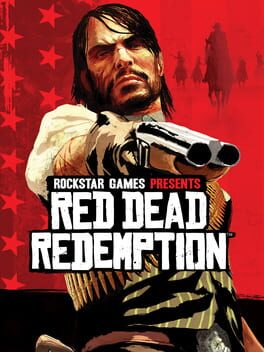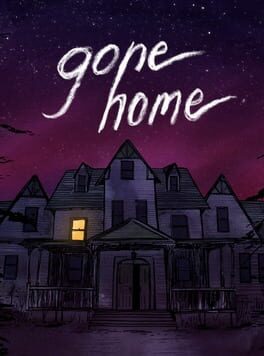Cuby
2023
This review contains spoilers
Blasphemous 2 plays almost exactly like its predecessor; it's not a big leap, but it doesn't need to be because the basic pillars are already there. It builds on that with some small, welcome changes like three different weapon sets that are perfectly integrated into exploring and reaching new places. My favorite was the Rapier/Dagger Combo that slices through enemies lightning-fast, and they especially helped a lot during later boss fights, particularly with the parry and block mechanics.
What especially stands out for me is the grotesquely designed game world and characters. I also call it the black metal aesthetic. For example, there's an NPC who feeds a baby with wax through a breast he cut off from his wife who died after childbirth and sewed onto himself. This is his penance imposed by the Miracle, just like many others who suffer a similar absurd fate. Also, the sense of place is beautifully done. From a distance, you see a cathedral hanging upside down on a mountain, winding its way through a valley, and you can actually visit that cathedral. Or a basilica that has sunk into the sea, but through your actions, it becomes visitable again through a reflection, and this reflection also has a gameplay component.
My biggest criticism is still the very monotonous soundtrack. While it thematically fits the Spanish-Christian-inspired setting well through its choice of instruments, it lacks punch and melodies. The only time I was musically pleasantly surprised was during a boss fight when, as the battle duration increased, the instruments became faster and more imposing. This is completely missing from the rest of the game.
Ending A is really special and it's the perfect farewell to the Penitent One. I got goosebumps during the last cutscene. The after-credits scene also heavily implies a DLC or even a sequel with a beloved character, and I'm all in for that. Well done, Game Kitchen!
What especially stands out for me is the grotesquely designed game world and characters. I also call it the black metal aesthetic. For example, there's an NPC who feeds a baby with wax through a breast he cut off from his wife who died after childbirth and sewed onto himself. This is his penance imposed by the Miracle, just like many others who suffer a similar absurd fate. Also, the sense of place is beautifully done. From a distance, you see a cathedral hanging upside down on a mountain, winding its way through a valley, and you can actually visit that cathedral. Or a basilica that has sunk into the sea, but through your actions, it becomes visitable again through a reflection, and this reflection also has a gameplay component.
My biggest criticism is still the very monotonous soundtrack. While it thematically fits the Spanish-Christian-inspired setting well through its choice of instruments, it lacks punch and melodies. The only time I was musically pleasantly surprised was during a boss fight when, as the battle duration increased, the instruments became faster and more imposing. This is completely missing from the rest of the game.
Ending A is really special and it's the perfect farewell to the Penitent One. I got goosebumps during the last cutscene. The after-credits scene also heavily implies a DLC or even a sequel with a beloved character, and I'm all in for that. Well done, Game Kitchen!
Thanks to @Detectivefail's very in-depth and well-written review of this game, and my urge to try yet another CRPG, I jumped right into it. 175 hours later, I can confidently say this is one of the best in its genre.
Like many others, I was immediately overwhelmed by the myriad choices during character creation, especially since I had no prior knowledge of the Pathfinder systems and ruleset. During that time, having rewatched the late 90's Berserk anime, I opted for a character reminiscent of Griffith. In hindsight, this choice was fitting with the theme of governing my own kingdom. Since I typically play neutral good characters, trying out a lawful evil one offered a refreshing new perspective on RPGs for me.
The writing for your companions is consistently excellent. A standout example is Valerie, a somewhat snobbish ex-noble paladin devoted to an art-loving deity, which doesn't quite align with her general demeanor. She just wants to live life on her own terms. Throughout the game, she and my main character had fantastic chemistry and often took on leadership roles in our diverse group of deep and non-clichéd characters. Overall, the dialogue is so vivid and crisp that it pulls you right into this world, making you lose track of time and your surroundings. This is one of those games you just can't play for only two hours a day.
The overarching plot is fairly typical for a CRPG, with godlike beings plotting schemes and manipulating "lesser" beings for their own benefit. It starts surprisingly slow and down-to-earth, without immediately overwhelming you with lore. Instead, you're gradually and organically introduced to the larger schemes as you progress.
As someone who usually prefers turn-based combat, I appreciated the option to use a turn-based mode. However, after some time, I noticed that the game is clearly designed for real-time combat. It often felt tedious when facing large groups of enemies, and there are many encounters like that, especially in the endgame. I switched back to real-time with pause, and it turned out to be a much better experience than I had anticipated.
What I didn't expect was how often I was completely obliterated on the 4th of 6 difficulty settings. In comparison, Baldur's Gate 3 feels like a walk in the park. I had to learn a lot and adapt to its systems just to stand a slight chance in most battles. Especially the final dungeons of each chapter introduced new ways to experience the battle system, making them particularly engaging.
The kingdom management was also quite addictive and well-integrated into the game. It's one of the few games where I genuinely enjoyed building something up from scratch. The political and role-playing choices during the numerous events felt deep and engaging, although they often lacked real consequences.
I'm really glad that games like this still exist today. From an economic perspective, it's quite daring to develop a 120+ hourish complex beast of an RPG, knowing that only a small percentage of players will even start or complete it. According to Steam, only 9.8% did.
I considered giving this a 5 out of 5, but I want to leave room for improvement, especially since Wrath of the Righteous is supposed to be even better.
Like many others, I was immediately overwhelmed by the myriad choices during character creation, especially since I had no prior knowledge of the Pathfinder systems and ruleset. During that time, having rewatched the late 90's Berserk anime, I opted for a character reminiscent of Griffith. In hindsight, this choice was fitting with the theme of governing my own kingdom. Since I typically play neutral good characters, trying out a lawful evil one offered a refreshing new perspective on RPGs for me.
The writing for your companions is consistently excellent. A standout example is Valerie, a somewhat snobbish ex-noble paladin devoted to an art-loving deity, which doesn't quite align with her general demeanor. She just wants to live life on her own terms. Throughout the game, she and my main character had fantastic chemistry and often took on leadership roles in our diverse group of deep and non-clichéd characters. Overall, the dialogue is so vivid and crisp that it pulls you right into this world, making you lose track of time and your surroundings. This is one of those games you just can't play for only two hours a day.
The overarching plot is fairly typical for a CRPG, with godlike beings plotting schemes and manipulating "lesser" beings for their own benefit. It starts surprisingly slow and down-to-earth, without immediately overwhelming you with lore. Instead, you're gradually and organically introduced to the larger schemes as you progress.
As someone who usually prefers turn-based combat, I appreciated the option to use a turn-based mode. However, after some time, I noticed that the game is clearly designed for real-time combat. It often felt tedious when facing large groups of enemies, and there are many encounters like that, especially in the endgame. I switched back to real-time with pause, and it turned out to be a much better experience than I had anticipated.
What I didn't expect was how often I was completely obliterated on the 4th of 6 difficulty settings. In comparison, Baldur's Gate 3 feels like a walk in the park. I had to learn a lot and adapt to its systems just to stand a slight chance in most battles. Especially the final dungeons of each chapter introduced new ways to experience the battle system, making them particularly engaging.
The kingdom management was also quite addictive and well-integrated into the game. It's one of the few games where I genuinely enjoyed building something up from scratch. The political and role-playing choices during the numerous events felt deep and engaging, although they often lacked real consequences.
I'm really glad that games like this still exist today. From an economic perspective, it's quite daring to develop a 120+ hourish complex beast of an RPG, knowing that only a small percentage of players will even start or complete it. According to Steam, only 9.8% did.
I considered giving this a 5 out of 5, but I want to leave room for improvement, especially since Wrath of the Righteous is supposed to be even better.
2024
I'm sorry, ex Fullbright, but this game missed the mark for me. It's the first game from the studio that I can't say I enjoyed.
The premise of a mother-daughter road trip to uncover a hidden family secret was very intriguing to me and fits perfectly with Fullbright's style of storytelling through letters and environmental cues. With the back-and-forth between the two characters, some of the magic of discovering things for yourself is lost. About 80% of their conversations are just exposition dumps. While the voice acting is great and there's chemistry between Tess and Opal, some of the dialogue just doesn't feel right and is honestly sometimes even poorly written.
The flute ambient soundtrack is annoyingly lifeless and lacks emotion. They even missed playing the essential radio songs during the car rides, which is a must-have for a road trip experience, why not add some nice early 2000 indie track? totally missed opportunity there.
The 2D character design against 3D backgrounds kind of works, but the lack of animations during dialogue is very noticeable. As Dusk Falls handled this much better, where scenes naturally flowed into one another. Here, it's just a monotonous sequence of the same three animations that sometimes don't even match what the character is saying or feeling.
Story-wise, it's somewhat okay. I see what they're trying to tell, and the message isn't lost; it subtly develops into something substantial by the end, and I could connect with it to some extent. It's even more frustrating because there seems to be a great script, but everything around it just feels off. I sincerely hope they get another chance to make a game without the development turmoil, as I really appreciate the way they use this medium.
The premise of a mother-daughter road trip to uncover a hidden family secret was very intriguing to me and fits perfectly with Fullbright's style of storytelling through letters and environmental cues. With the back-and-forth between the two characters, some of the magic of discovering things for yourself is lost. About 80% of their conversations are just exposition dumps. While the voice acting is great and there's chemistry between Tess and Opal, some of the dialogue just doesn't feel right and is honestly sometimes even poorly written.
The flute ambient soundtrack is annoyingly lifeless and lacks emotion. They even missed playing the essential radio songs during the car rides, which is a must-have for a road trip experience, why not add some nice early 2000 indie track? totally missed opportunity there.
The 2D character design against 3D backgrounds kind of works, but the lack of animations during dialogue is very noticeable. As Dusk Falls handled this much better, where scenes naturally flowed into one another. Here, it's just a monotonous sequence of the same three animations that sometimes don't even match what the character is saying or feeling.
Story-wise, it's somewhat okay. I see what they're trying to tell, and the message isn't lost; it subtly develops into something substantial by the end, and I could connect with it to some extent. It's even more frustrating because there seems to be a great script, but everything around it just feels off. I sincerely hope they get another chance to make a game without the development turmoil, as I really appreciate the way they use this medium.
2022
Do Androids Dream of Tortoises?
Ghost Song just oozes with melancholic atmosphere and a sense of exploration. You are stranded on a moon infested by some sort of plant infestation without any memories. Your only purpose is to help a stranded crew that crashed due to a magnetic field which pulls every spaceship onto the surface. While the premise is not that intriguing at first, it develops into a greatly written tale of sacrifice and humanity that just gives you enough lore bits and clues to comprehend your place in it, while it can sometimes turn into a guessing game of where you can obtain that knowledge because some vital NPCs move places or turn up out of the blue in different spots on the map you already marked as explored, my sense of wonder still kept the better of me, and I'm sure it was purposely designed that way. It's not as grand or entangled as Hollow Knight or the modern FromSoftware games which obviously deeply influenced the game, but rather focused on a certain theme, and I found that rather refreshing.
It plays like a typical modern metroidvania with more focus on ranged combat than melee. You have many different modules, some more helpful than others, and several weapons. My favorite was definitely the precise laser gun mixed with a satisfying magnum of sorts. The biggest gripe I have, though, were the boss fights, which were very unspectacular and rather easy. Most of them had three moves at most and a rather large health pool, which turned them into a test of patience rather than skill.
The soundtrack, though, was something else; I absolutely loved it. It's practically a more simplistic "Tomorrow's Harvest" album from Boards of Canada with a more melancholic touch. The song that was playing in Stoffbloom will definitely live rent-free in my head for the next weeks. Also, it absolutely helped to alleviate the already lonely and post-apocalyptic atmosphere to the next level.
If I were to make a list with games like Hollow Knight, this one would definitely be among the top three. It comes very close to some aspects of it, and I think with a few more fine-tuning in the gameplay and some more budget to alleviate some of its presentation, the next game of this studio can reach new heights.
Ghost Song just oozes with melancholic atmosphere and a sense of exploration. You are stranded on a moon infested by some sort of plant infestation without any memories. Your only purpose is to help a stranded crew that crashed due to a magnetic field which pulls every spaceship onto the surface. While the premise is not that intriguing at first, it develops into a greatly written tale of sacrifice and humanity that just gives you enough lore bits and clues to comprehend your place in it, while it can sometimes turn into a guessing game of where you can obtain that knowledge because some vital NPCs move places or turn up out of the blue in different spots on the map you already marked as explored, my sense of wonder still kept the better of me, and I'm sure it was purposely designed that way. It's not as grand or entangled as Hollow Knight or the modern FromSoftware games which obviously deeply influenced the game, but rather focused on a certain theme, and I found that rather refreshing.
It plays like a typical modern metroidvania with more focus on ranged combat than melee. You have many different modules, some more helpful than others, and several weapons. My favorite was definitely the precise laser gun mixed with a satisfying magnum of sorts. The biggest gripe I have, though, were the boss fights, which were very unspectacular and rather easy. Most of them had three moves at most and a rather large health pool, which turned them into a test of patience rather than skill.
The soundtrack, though, was something else; I absolutely loved it. It's practically a more simplistic "Tomorrow's Harvest" album from Boards of Canada with a more melancholic touch. The song that was playing in Stoffbloom will definitely live rent-free in my head for the next weeks. Also, it absolutely helped to alleviate the already lonely and post-apocalyptic atmosphere to the next level.
If I were to make a list with games like Hollow Knight, this one would definitely be among the top three. It comes very close to some aspects of it, and I think with a few more fine-tuning in the gameplay and some more budget to alleviate some of its presentation, the next game of this studio can reach new heights.
WHAT. A. GAME.
You all know that warm stomach feeling, a mix of sadness and delight when you experience something touching in a video game, right? I had this feeling constantly while playing Disco Elysium. For a week, I couldn't think about anything else; it was engraved in my brain. Not just the typical "what to do next" questions, but rather the big philosophical questions of meaning. I really wanted to understand the writer's vision and thoughts when they created that masterpiece.
The writing is excellent and so deeply introspective; you can clearly feel that he poured his heart out while creating this. It must have been a cathartic feeling for him, and it was for me as well. As someone who grew up in a similar, though not as impoverished, environment as depicted in the game, there were so many instances where I just felt understood. My father struggled with alcoholism for as long as I can remember, much like the main protagonist. As a child, I never quite understood what drove him to that path. After his death when I was still a teenager, he remained an enigma to me. I feel like I have a deeper understanding of his struggles now and how he coped with them.
The real star of the game might be Kim Kitsuragi, though. His input and more logical demeanor provided a great contrast to the way I played Harry. It was a sort of good cop/bad cop dynamic between these two, resulting in many memorable and, at times, very funny moments.
Two things, though, I didn't really like: the clothing swap mechanic to boost a certain skill and succeed at a dice check felt immersion-breaking for me. I would have liked it more if you had to choose your outfit for the day and had to stick with it throughout. Also, the political choices you have as a player are too black and white. I would have preferred a more subtle approach there, although it really fits with some of the sarcastic dialogue.
what this game gave me was a completely different vision of my own, to really live the life of something else and understand them and that's what roleplaying is all about for me, to see the world in the eyes of something else and i can't praise it enough for it.
You all know that warm stomach feeling, a mix of sadness and delight when you experience something touching in a video game, right? I had this feeling constantly while playing Disco Elysium. For a week, I couldn't think about anything else; it was engraved in my brain. Not just the typical "what to do next" questions, but rather the big philosophical questions of meaning. I really wanted to understand the writer's vision and thoughts when they created that masterpiece.
The writing is excellent and so deeply introspective; you can clearly feel that he poured his heart out while creating this. It must have been a cathartic feeling for him, and it was for me as well. As someone who grew up in a similar, though not as impoverished, environment as depicted in the game, there were so many instances where I just felt understood. My father struggled with alcoholism for as long as I can remember, much like the main protagonist. As a child, I never quite understood what drove him to that path. After his death when I was still a teenager, he remained an enigma to me. I feel like I have a deeper understanding of his struggles now and how he coped with them.
The real star of the game might be Kim Kitsuragi, though. His input and more logical demeanor provided a great contrast to the way I played Harry. It was a sort of good cop/bad cop dynamic between these two, resulting in many memorable and, at times, very funny moments.
Two things, though, I didn't really like: the clothing swap mechanic to boost a certain skill and succeed at a dice check felt immersion-breaking for me. I would have liked it more if you had to choose your outfit for the day and had to stick with it throughout. Also, the political choices you have as a player are too black and white. I would have preferred a more subtle approach there, although it really fits with some of the sarcastic dialogue.
what this game gave me was a completely different vision of my own, to really live the life of something else and understand them and that's what roleplaying is all about for me, to see the world in the eyes of something else and i can't praise it enough for it.
2023
Decarnation has such a promising premise and fantastic art design, but the plot constantly moves in circles with no real direction or purpose. It tries so hard to convey something meaningful, but it only scratches the surface of the many heavy themes it attempts to portray. The last two chapters were so full of cheesy and melodramatic dialogue that, for a moment, I thought I was stuck in a post-2000 shonen anime. The rhythm mini-games are pretty fun though.
2020
After the first trailer of the game was released, I, like many others, enthusiastically joined the extensive hype surrounding Cyberpunk, and for valid reasons. At that time, CD Projekt Red was at the height of its popularity and held in high regard by numerous gamers. I was already a devoted fan of The Witcher, having read the books and played the games. Following the third game, I considered them the epitome of video games. Now, a decade later, with more gaming experience, I can confidently assert that Cyberpunk stands out as the most mediocre triple-A game in recent years.
I'd like to begin by addressing the most significant issue I encountered during my playthrough: the protagonist. V is an unlikable character, and you can't exert much influence over their demeanor. The background you choose at the start is immediately obliterated within the first few hours, and suddenly, all Vs are Streetkids. Most of the time, you're presented with three dialogue choices that, 80% of the time, lead to the same outcome, essentially offering a choice between being even more of a jerk or less of one. V lacks personality aside from a chip with Johnny Silverhand in their head. This becomes especially apparent in scenes with interesting side characters like Johnny or Judy. Every time V is part of a conversation with them, it seems as if they're a third-grader on their first day of acting class. It doesn't help that the voice actor is not on the same level as the other characters. In particular, the male V's delivery feels off at times, lacking a sense of nuance or subtle notes. All his lines are delivered with a wrecking ball, rendering true roleplaying obsolete.
My second most significant gripe concerns the open world and how every interaction with it shatters immersion. Every NPC seems to be merely part of the backdrop, and attempting to interact with them often results in chaos. If you accidentally scratch their car, the NPC completely loses composure and starts ramming everything in its way, triggering a chain reaction of complete chaos. About 95% of the street food vendors are there merely to observe a mindless NPC endlessly repeating the same burger-flipping animation in a loop. I never felt like my character was truly integrated into the city. While many open-world games in recent years have faced similar issues, it has never been as noticeable as in Cyberpunk.
Setting aside all the negativity, I still had a moment where Cyberpunk could shine, and perhaps it serves as an example of thinking smaller rather than bigger. I had just completed a quest addressing the exploitation of sex workers, depicting how they are treated as machines rather than humans. It was a dark and well-written storyline that reached an even darker climax later in the game. After reflecting on the events with another side character, I decided to head home early in the morning. It was a rainy morning, acid rain, to be exact, with thick fog covering the sky. Opting for the train to return home, I tuned in to the jazz radio channel, and Chet Baker's "You Don't Know What Love Is" played as I gazed out of the train window at the neon-lit city i contemplated what I had just experienced.
In these moments, Cyberpunk is at its best. However, such instances are so rare that I can't help but drown my sorrows in another mindless NCPD dispatcher quest. These quests seem never-ending in a game full of bad design choices and poorly implemented roleplay elements.
I'd like to begin by addressing the most significant issue I encountered during my playthrough: the protagonist. V is an unlikable character, and you can't exert much influence over their demeanor. The background you choose at the start is immediately obliterated within the first few hours, and suddenly, all Vs are Streetkids. Most of the time, you're presented with three dialogue choices that, 80% of the time, lead to the same outcome, essentially offering a choice between being even more of a jerk or less of one. V lacks personality aside from a chip with Johnny Silverhand in their head. This becomes especially apparent in scenes with interesting side characters like Johnny or Judy. Every time V is part of a conversation with them, it seems as if they're a third-grader on their first day of acting class. It doesn't help that the voice actor is not on the same level as the other characters. In particular, the male V's delivery feels off at times, lacking a sense of nuance or subtle notes. All his lines are delivered with a wrecking ball, rendering true roleplaying obsolete.
My second most significant gripe concerns the open world and how every interaction with it shatters immersion. Every NPC seems to be merely part of the backdrop, and attempting to interact with them often results in chaos. If you accidentally scratch their car, the NPC completely loses composure and starts ramming everything in its way, triggering a chain reaction of complete chaos. About 95% of the street food vendors are there merely to observe a mindless NPC endlessly repeating the same burger-flipping animation in a loop. I never felt like my character was truly integrated into the city. While many open-world games in recent years have faced similar issues, it has never been as noticeable as in Cyberpunk.
Setting aside all the negativity, I still had a moment where Cyberpunk could shine, and perhaps it serves as an example of thinking smaller rather than bigger. I had just completed a quest addressing the exploitation of sex workers, depicting how they are treated as machines rather than humans. It was a dark and well-written storyline that reached an even darker climax later in the game. After reflecting on the events with another side character, I decided to head home early in the morning. It was a rainy morning, acid rain, to be exact, with thick fog covering the sky. Opting for the train to return home, I tuned in to the jazz radio channel, and Chet Baker's "You Don't Know What Love Is" played as I gazed out of the train window at the neon-lit city i contemplated what I had just experienced.
In these moments, Cyberpunk is at its best. However, such instances are so rare that I can't help but drown my sorrows in another mindless NCPD dispatcher quest. These quests seem never-ending in a game full of bad design choices and poorly implemented roleplay elements.
2020
Giant Squid already showed with Abzu that they mastered the way of creating games with a zen like flow and atmosphere. The Pathless follows the same path, and throughout my roughly 13 hours of gameplay,I experienced nothing but tranquility and a sense of inner peace.If you're a fan of Studio Ghibli's Princess Mononoke, you'll discover numerous similarities in The Pathless. While playing, I found myself recalling the movie frequently, making it perhaps the closest we'll come to a Mononoke video game.
It probably has the most helpful and charming companion out of any game I've played recently. Every time I could pet the eagle, my heart jumped with joy; his animations and demeanor felt so lifelike. he is also very well integrated into the puzzles and traversal aspects. At the end of our journey, i really felt melancholic when it was time to say goodbye.
The puzzle design may become repetitive over time, and, with a few exceptions, the lore bits are quite basic. The initial three areas seemed somewhat monotonous and perhaps less spectacular, especially when compared to the final area. Despite this, the boss fights were expertly telegraphed, delivering a cinematic and epic experience. Even though you are practically invincible, there's still a rush of adrenaline in each one, creating a compelling contrast to the otherwise calm and peaceful nature of the game.
It probably has the most helpful and charming companion out of any game I've played recently. Every time I could pet the eagle, my heart jumped with joy; his animations and demeanor felt so lifelike. he is also very well integrated into the puzzles and traversal aspects. At the end of our journey, i really felt melancholic when it was time to say goodbye.
The puzzle design may become repetitive over time, and, with a few exceptions, the lore bits are quite basic. The initial three areas seemed somewhat monotonous and perhaps less spectacular, especially when compared to the final area. Despite this, the boss fights were expertly telegraphed, delivering a cinematic and epic experience. Even though you are practically invincible, there's still a rush of adrenaline in each one, creating a compelling contrast to the otherwise calm and peaceful nature of the game.
2023
Cocooon has probably the most creative and interesting art design I've seen in recent times. It looks so alienesque and unique. If I were to draw a comparison, I might describe it as a fusion of HR Giger's style and the aesthetic found in Hollow Knight. I also appreciate the minimalistic approach in the game design; you practically only need one button to interact with the world, and there are no intrusive tutorial pop-ups.
Sadly, it falls flat for me when it comes to its puzzle design. It just feels very tedious and formulaic after a certain point, and the backtracking in the later parts of the game doesn't help to create a satisfying gameplay loop. While the boss fights serve as a welcome distraction, they are rather gimmicky and just too easy.
The synth-like futuristic soundtrack is quite enjoyable, but its usage is too sparse. Many tracks abruptly stop just as I begin to embrace them. I genuinely don't understand that design choice. As someone who truly values the perfect tune at the right moment, a more consistent soundtrack could have significantly enhanced my immersion in the truly beautiful world it seeks to create.
Sadly, it falls flat for me when it comes to its puzzle design. It just feels very tedious and formulaic after a certain point, and the backtracking in the later parts of the game doesn't help to create a satisfying gameplay loop. While the boss fights serve as a welcome distraction, they are rather gimmicky and just too easy.
The synth-like futuristic soundtrack is quite enjoyable, but its usage is too sparse. Many tracks abruptly stop just as I begin to embrace them. I genuinely don't understand that design choice. As someone who truly values the perfect tune at the right moment, a more consistent soundtrack could have significantly enhanced my immersion in the truly beautiful world it seeks to create.
2023
Bzzzt instantly beams you back to the 80s platformers with its colorful futuristic art design and the chiptune-like soundtrack. The controls are very precise, and while it's not as merciless as other games of the genre, it can still be quite challenging traversing through the 52 levels on the hunt for golden screws and a better time. If you're a fan of the genre, it's a must-buy. Also, if you have problems with timing in platformer games, Bzzzt has a very accessible easy mode without compromising the core gameplay.
I would say it's definitely on par with modern games of the genre, like Celeste gameplay-wise. It's a bit of a bummer for me personally that you can summarize the whole plot in one sentence, since I quite enjoyed it in Celeste, but that might be a plus for you if you just want to experience a short little platformer.
I would say it's definitely on par with modern games of the genre, like Celeste gameplay-wise. It's a bit of a bummer for me personally that you can summarize the whole plot in one sentence, since I quite enjoyed it in Celeste, but that might be a plus for you if you just want to experience a short little platformer.
2017
Although Tacoma does not have quite the emotional impact of Gone Home, it tells a compelling story about corporate greed in a rather realistic space setting in the year 2088. I love how the developers tell their story mostly through environmental clues, and sometimes it just takes one hidden letter or a well-placed object to evoke emotions and if u take ur time getting to know the characters and their small little stories u can't help but feel empathetic for everyone of them. Again, I like the song choices that make certain moments much more memorable. I can't wait to dive deeper into the tracks, just like I did with Gone Home, where I discovered bands such as Le Tigre and Bikini Kill. I'm quite eager to see what they have in store with their next game called Open Roads.
In a recent tweet, an indie game developer referred to Baldur's Gate 3 as a gaming anomaly. While I absolutely adore BG3, especially for the fact that it brought the rather niche genre of CRPGs to a broader audience, the true anomaly in the world of video games is Red Dead Redemption 2 for me.
What truly set this game apart from others, is the remarkable level of attention to detail evident in every facet of its design. Every individual you encounter follows their own daily routine, from constructing houses to initiating a bar brawl on their own, or simply basking in the sun after a hunting expedition - and this is just the tip of the iceberg. Throughout my numerous playthroughs, there were countless moments where I found myself engrossed in my surroundings, and at times, the game even rewarded my careful observation with small stories. For instance, while I was on my way to procure some food for our camp, I spotted a distant plume of smoke on the horizon. I cautiously rode towards it, took cover behind a tree, and watched to discern the situation. There, I found several veterans of the Civil War who had been defeated by the Northern states and were now engaged in some form of guerrilla warfare against their "oppressors." From my concealed vantage point, I overheard them discussing fallen comrades and lamenting the sorry state of the world after the war. In another example I found myself fishing by a picturesque pond in a valley encircled by mountains, where I could keenly observe the wildlife going about their activities. The sight of a bald eagle snatching a fish from the water right in front of me was incredibly captivating to witness. These are merely a few minor examples within a world teeming with intricacies for players to explore, many of which may go unnoticed by the majority of players.
Another significant aspect that I genuinely appreciate is the deliberate slow pacing. Everything you undertake carries weight and feels quite realistic. Whether it's working in the camp, chopping wood, cooking meat, or crafting arrows, it all takes its time. I can't commend Rockstar enough for adopting this approach because it tremendously enhances your immersion in this world and your role as Arthur. You can truly role-play as Arthur, even though he's a well-defined character with his own mind and thoughts. He even maintains his own journal where you can delve into his innermost desires and anxieties. With each experience you share with him, you develop a deeper sense of empathy, especially in the last two chapters.
It's not only the main protagonist who is exceptionally well-written, all the side characters, especially your gang members, possess unique and non-cliché personalities. The gang's leader, Dutch van der Linde, is particularly intriguing because his true identity and intentions aren't immediately apparent. As you get to know him better, you can perceive the complexities behind the facade of a charismatic leader figure who grapples with profound self-doubt and regrets. To be honest, if I were in Arthur's situation, living in that era and with his history, I'd likely follow this man to the ends of the earth as well.
From a technical perspective, the game looks incredibly impressive. Each frame could be a painting crafted by a 19th-century landscape artist. The atmospheric lighting, particularly in Saint Denis at night, is awe-inspiring. One time, I ventured to the highest mountain and observed a complete day and night cycle, and it looked remarkably realistic and sharp. When you simply explore the open world, nearly all your senses are engaged, from the chirping of birds to the sound of horses' hooves or the howling of a pack of wolves.
The soundtrack consistently strikes the perfect notes for every situation. Some key story moments excel primarily because the right song accompanies them. There were numerous instances where I experienced goosebumps solely from the soundtrack. Certain tracks also feature a significant instrumental post-rock influence, which happens to be one of my favorite genres, and I truly appreciate that. For instance, the moment when you return from Guarma and ride back to camp ranks among my favorite moments in video game history because it masterfully conveys Arthur's current state without relying on words – it's a prime example of "show don't tell."
Now, concerning the main plot, I believe the developers were avid enthusiasts of anti-Western literature, such as "Butcher's Crossing," or films like "There Will Be Blood." They skillfully toy with the romantic clichés of the American West and turn them on their heads. The central theme of a world you're familiar with gradually descending into chaos is depicted with great attention to subtle details and expertly crafted, realistic dialogue. Rockstar has so much to tell, and you can't help but become fully engaged, even in smaller side narratives. For instance, there's the story of a circus troupe that lost its main attraction, a large tiger that escaped and is now causing turmoil on a small farm, or the tale of a despondent gunslinger who can't find solace after the "heroic" deeds he performed in the past.
If I were to be critical and nitpick certain aspects I didn't like, it would be that Rockstar could have pushed the boundaries of realism further in game design. For instance, they could have implemented a more extended day and night cycle or a heightened level of realism in a survival mode where you'd need to eat and sleep daily. Additionally, there are moments when the wildlife doesn't behave naturally. For example, it's hard to imagine that a healthy, well-fed pack of wolves would casually attack a human on horseback just passing through their territory. There are also instances where deer seemingly appear out of nowhere, making it feel like they are conveniently placed for the player to hunt on their way to the next objective. Also Arthur can take way too much bullets before he dies, especially with a full health core, again i would've liked a more realistic approach, but taken that rockstar has it's roots in more arcady game series like GTA i can understand this aspect to not fully loose a majority of their playerbase.
Red Dead Redemption 2 is possibly the greatest game ever, a contemporary masterpiece of art that may well remain relevant even a decade or two from now.
What truly set this game apart from others, is the remarkable level of attention to detail evident in every facet of its design. Every individual you encounter follows their own daily routine, from constructing houses to initiating a bar brawl on their own, or simply basking in the sun after a hunting expedition - and this is just the tip of the iceberg. Throughout my numerous playthroughs, there were countless moments where I found myself engrossed in my surroundings, and at times, the game even rewarded my careful observation with small stories. For instance, while I was on my way to procure some food for our camp, I spotted a distant plume of smoke on the horizon. I cautiously rode towards it, took cover behind a tree, and watched to discern the situation. There, I found several veterans of the Civil War who had been defeated by the Northern states and were now engaged in some form of guerrilla warfare against their "oppressors." From my concealed vantage point, I overheard them discussing fallen comrades and lamenting the sorry state of the world after the war. In another example I found myself fishing by a picturesque pond in a valley encircled by mountains, where I could keenly observe the wildlife going about their activities. The sight of a bald eagle snatching a fish from the water right in front of me was incredibly captivating to witness. These are merely a few minor examples within a world teeming with intricacies for players to explore, many of which may go unnoticed by the majority of players.
Another significant aspect that I genuinely appreciate is the deliberate slow pacing. Everything you undertake carries weight and feels quite realistic. Whether it's working in the camp, chopping wood, cooking meat, or crafting arrows, it all takes its time. I can't commend Rockstar enough for adopting this approach because it tremendously enhances your immersion in this world and your role as Arthur. You can truly role-play as Arthur, even though he's a well-defined character with his own mind and thoughts. He even maintains his own journal where you can delve into his innermost desires and anxieties. With each experience you share with him, you develop a deeper sense of empathy, especially in the last two chapters.
It's not only the main protagonist who is exceptionally well-written, all the side characters, especially your gang members, possess unique and non-cliché personalities. The gang's leader, Dutch van der Linde, is particularly intriguing because his true identity and intentions aren't immediately apparent. As you get to know him better, you can perceive the complexities behind the facade of a charismatic leader figure who grapples with profound self-doubt and regrets. To be honest, if I were in Arthur's situation, living in that era and with his history, I'd likely follow this man to the ends of the earth as well.
From a technical perspective, the game looks incredibly impressive. Each frame could be a painting crafted by a 19th-century landscape artist. The atmospheric lighting, particularly in Saint Denis at night, is awe-inspiring. One time, I ventured to the highest mountain and observed a complete day and night cycle, and it looked remarkably realistic and sharp. When you simply explore the open world, nearly all your senses are engaged, from the chirping of birds to the sound of horses' hooves or the howling of a pack of wolves.
The soundtrack consistently strikes the perfect notes for every situation. Some key story moments excel primarily because the right song accompanies them. There were numerous instances where I experienced goosebumps solely from the soundtrack. Certain tracks also feature a significant instrumental post-rock influence, which happens to be one of my favorite genres, and I truly appreciate that. For instance, the moment when you return from Guarma and ride back to camp ranks among my favorite moments in video game history because it masterfully conveys Arthur's current state without relying on words – it's a prime example of "show don't tell."
Now, concerning the main plot, I believe the developers were avid enthusiasts of anti-Western literature, such as "Butcher's Crossing," or films like "There Will Be Blood." They skillfully toy with the romantic clichés of the American West and turn them on their heads. The central theme of a world you're familiar with gradually descending into chaos is depicted with great attention to subtle details and expertly crafted, realistic dialogue. Rockstar has so much to tell, and you can't help but become fully engaged, even in smaller side narratives. For instance, there's the story of a circus troupe that lost its main attraction, a large tiger that escaped and is now causing turmoil on a small farm, or the tale of a despondent gunslinger who can't find solace after the "heroic" deeds he performed in the past.
If I were to be critical and nitpick certain aspects I didn't like, it would be that Rockstar could have pushed the boundaries of realism further in game design. For instance, they could have implemented a more extended day and night cycle or a heightened level of realism in a survival mode where you'd need to eat and sleep daily. Additionally, there are moments when the wildlife doesn't behave naturally. For example, it's hard to imagine that a healthy, well-fed pack of wolves would casually attack a human on horseback just passing through their territory. There are also instances where deer seemingly appear out of nowhere, making it feel like they are conveniently placed for the player to hunt on their way to the next objective. Also Arthur can take way too much bullets before he dies, especially with a full health core, again i would've liked a more realistic approach, but taken that rockstar has it's roots in more arcady game series like GTA i can understand this aspect to not fully loose a majority of their playerbase.
Red Dead Redemption 2 is possibly the greatest game ever, a contemporary masterpiece of art that may well remain relevant even a decade or two from now.
2010
I'm likely among the fortunate few who have experienced the second Red Dead game prior to the first one. This undoubtedly aided in intensifying the emotional impact during pivotal moments within the story. The entire atmosphere is instantly established as we embark on a train journey towards the final bastion of the wild west. During this ride, an elderly noblewoman comments on how Native Americans should ostensibly be happier due to the civilizing influence of white men. Liberty emerges as a central theme yet again, exploring its potential to corrupt and dismantle individuals.
this time we venture into Mexico, reliving the turmoil of the civil war. Rockstar portrays this historical conflict with unflinching cruelty, while simultaneously depicting the struggles of the local populace. Of course, there's a fair share of exaggeration and dark humor. Throughout John's odyssey, a recurring question lingers: will he find fulfillment upon reaching his ultimate goal, or will he suffer the emotional demise that has befallen many men attempting a path of redemption?
The writers provide a satisfying conclusion to the overarching saga of the Dutch van der Linde gang. This finale struck me with an emotional impact akin to the force of a double-barreled shotgun. The occasionally lifeless open-world design and occasionally clunky gameplay become inconsequential when you approach the game's conclusion, underscoring the remarkable quality of the writing.
this time we venture into Mexico, reliving the turmoil of the civil war. Rockstar portrays this historical conflict with unflinching cruelty, while simultaneously depicting the struggles of the local populace. Of course, there's a fair share of exaggeration and dark humor. Throughout John's odyssey, a recurring question lingers: will he find fulfillment upon reaching his ultimate goal, or will he suffer the emotional demise that has befallen many men attempting a path of redemption?
The writers provide a satisfying conclusion to the overarching saga of the Dutch van der Linde gang. This finale struck me with an emotional impact akin to the force of a double-barreled shotgun. The occasionally lifeless open-world design and occasionally clunky gameplay become inconsequential when you approach the game's conclusion, underscoring the remarkable quality of the writing.
2000
As a child, I played numerous Final Fantasy games, but for various reasons, I never managed to complete any of them. Now that I have finished quite a few JRPGs, I believe it's finally time to delve into the series. After conducting some research, I chose FF IX as my starting point.
To my astonishment, the game hasn't shown its age in terms of gameplay. It actually felt quite refreshing to me since it was my first experience with the ATB mechanic. Furthermore, the presentation is truly impressive, surpassing many modern games in terms of art design and overall production.
Undoubtedly, the main cast, especially the adorable and clumsy little black mage, Vivi, steals the show. His journey to find meaning in his existence is beautifully written, and every scene involving him is a delight. The game effectively conveys emotions through gestures and text walls instead of relying on a full localization, which helped me further sympathize with the characters as I imagined their voices in my head. Another favorite of mine was Quina, who serves as comic relief with a simple yet effective purpose of devouring delicious food.
The main plot of the game delivers a impactful message, and it is filled with numerous grand and intriguing moments. I never experienced boredom; instead, I was constantly eager for the next development. the main topic was certainly the circle of life and death and how humanity deals with mortality, it comes with quite a bit pathos and at times it's quite melodramatic but i mean that's what u paid for when u play a JRPG so i didn't mind it that much.
I completed most of the side quests, which mainly consisted of straightforward fetch quests. However, they were cleverly integrated into the main story, and I genuinely enjoyed them. Discovering secrets throughout the game was also immensely satisfying
I also found great enjoyment in playing the card game Tetra Master. I have always appreciated when mini-games have some connection to the overall game, and the fact that I could collect cards by defeating beasts and then obtain their corresponding monster cards was quite cool. However, I must admit that after around 100 games or so, the experience became somewhat repetitive due to the RNG factor.
One of the aspects I eagerly anticipated was the soundtrack, and I must admit I was somewhat disappointed. Many tracks were too monotonous and forcefully took the spotlight, particularly the typical organ tracks that I have grown tired of. It felt like only the epic tracks that accompanied intense moments truly resonated with me. I hope this aspect differs in other Final Fantasy games. upon re listening to the soundtrack on tape i actually enjoyed it a lot more, maybe it was the lack of high soundquality in my verison of the game or the fact that it just works better without the game.
To my astonishment, the game hasn't shown its age in terms of gameplay. It actually felt quite refreshing to me since it was my first experience with the ATB mechanic. Furthermore, the presentation is truly impressive, surpassing many modern games in terms of art design and overall production.
Undoubtedly, the main cast, especially the adorable and clumsy little black mage, Vivi, steals the show. His journey to find meaning in his existence is beautifully written, and every scene involving him is a delight. The game effectively conveys emotions through gestures and text walls instead of relying on a full localization, which helped me further sympathize with the characters as I imagined their voices in my head. Another favorite of mine was Quina, who serves as comic relief with a simple yet effective purpose of devouring delicious food.
The main plot of the game delivers a impactful message, and it is filled with numerous grand and intriguing moments. I never experienced boredom; instead, I was constantly eager for the next development. the main topic was certainly the circle of life and death and how humanity deals with mortality, it comes with quite a bit pathos and at times it's quite melodramatic but i mean that's what u paid for when u play a JRPG so i didn't mind it that much.
I completed most of the side quests, which mainly consisted of straightforward fetch quests. However, they were cleverly integrated into the main story, and I genuinely enjoyed them. Discovering secrets throughout the game was also immensely satisfying
I also found great enjoyment in playing the card game Tetra Master. I have always appreciated when mini-games have some connection to the overall game, and the fact that I could collect cards by defeating beasts and then obtain their corresponding monster cards was quite cool. However, I must admit that after around 100 games or so, the experience became somewhat repetitive due to the RNG factor.
One of the aspects I eagerly anticipated was the soundtrack, and I must admit I was somewhat disappointed. Many tracks were too monotonous and forcefully took the spotlight, particularly the typical organ tracks that I have grown tired of. It felt like only the epic tracks that accompanied intense moments truly resonated with me. I hope this aspect differs in other Final Fantasy games. upon re listening to the soundtrack on tape i actually enjoyed it a lot more, maybe it was the lack of high soundquality in my verison of the game or the fact that it just works better without the game.
2013
Gone Home deeply resonated with me, much like only a handful of games I've encountered in the past. It bears striking resemblances to my initial playthrough of Edith Finch, to the point where I wouldn't be surprised if the developers of Edith Finch were avid fans of Gone Home.
Right from the start, I was hooked by its eerie and detailed sound design. you can hear faint whispers and cracking of old wooden floors, all while a thunderstorm raged outside. This created the perfect atmosphere for uncovering the bittersweet stories of the family members in an old house all by yourself. In particular Sam's story was relatable and beautifully conveyed through fragments of notes and diary entries that were voiced in the background.
As someone who longs to have experienced the '90s as a teenager, it was an absolute delight to discover all the pop culture references throughout the game. And as a fan of noise rock, I couldn't contain my excitement when I came across mentions of Guided by Voices on a magazine cover or a concert poster featuring Sonic Youth. The cherry on top was the emo song playing during the credits, which definitely brought a tear to my eye.
i feel like this game was made for a really specific audience and i'm probably one of them.
Right from the start, I was hooked by its eerie and detailed sound design. you can hear faint whispers and cracking of old wooden floors, all while a thunderstorm raged outside. This created the perfect atmosphere for uncovering the bittersweet stories of the family members in an old house all by yourself. In particular Sam's story was relatable and beautifully conveyed through fragments of notes and diary entries that were voiced in the background.
As someone who longs to have experienced the '90s as a teenager, it was an absolute delight to discover all the pop culture references throughout the game. And as a fan of noise rock, I couldn't contain my excitement when I came across mentions of Guided by Voices on a magazine cover or a concert poster featuring Sonic Youth. The cherry on top was the emo song playing during the credits, which definitely brought a tear to my eye.
i feel like this game was made for a really specific audience and i'm probably one of them.
